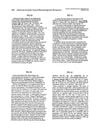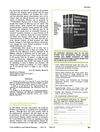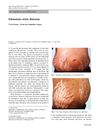 4 citations,
January 2019 in “PubMed”
4 citations,
January 2019 in “PubMed” Patterned hair loss in women is linked to hormonal imbalances and biochemical changes, and should be evaluated for underlying health issues.
 July 2022 in “Journal of Dermatology and Dermatologic Surgery”
July 2022 in “Journal of Dermatology and Dermatologic Surgery” People with chronic hair loss often have lower Vitamin B12 levels.
 1 citations,
August 2023 in “Curēus”
1 citations,
August 2023 in “Curēus” Metformin helps reduce PCOS-related infertility by improving insulin sensitivity and inducing ovulation.
1 citations,
October 2021 in “Journal of Cosmetic Dermatology”  February 2024 in “Clinical, Cosmetic and Investigational Dermatology”
February 2024 in “Clinical, Cosmetic and Investigational Dermatology” Certain fats in the blood are linked to an increased risk of male pattern baldness.
9 citations,
January 2007 in “Journal of dermatological treatment” Testosterone gel helps increase facial hair in young men with beta-thalassemia major.
 December 2013 in “대한피부과학회지”
December 2013 in “대한피부과학회지” Korean women with female pattern hair loss have higher levels of ferritin, testosterone, and vitamin D than average.
 10 citations,
August 2014 in “Skin research and technology”
10 citations,
August 2014 in “Skin research and technology” Sleep, testosterone levels, and a specific enzyme activity affect skin oil production in women.
 1 citations,
July 2022 in “Movement disorders clinical practice”
1 citations,
July 2022 in “Movement disorders clinical practice” A patient with Wilson's disease showed hair-pulling behavior as an initial symptom.
 July 2022 in “International Journal of Health Sciences (IJHS) (En línea)”
July 2022 in “International Journal of Health Sciences (IJHS) (En línea)” Men with Type 2 Diabetes have lower DHT levels, which may affect fertility and lipid profiles.
7 citations,
July 2020 in “Dermatologic therapy” Premature graying of hair is linked to various health issues and can sometimes be reversed by treating underlying conditions.
 5 citations,
February 1996 in “Clinical pharmacology and therapeutics/Clinical pharmacology & therapeutics”
5 citations,
February 1996 in “Clinical pharmacology and therapeutics/Clinical pharmacology & therapeutics” Minoxidil given intravenously caused small changes in diastolic blood pressure and increased heart rate at higher concentrations in patients with high blood pressure.
 35 citations,
October 2006 in “Journal of Dermatology”
35 citations,
October 2006 in “Journal of Dermatology” Teen hair loss common in boys, linked to family history and mild symptoms.
 April 2020 in “Journal of the Endocrine Society”
April 2020 in “Journal of the Endocrine Society” An 87-year-old man showed unusual signs of Hodgkin lymphoma, primarily high calcium levels, which improved after treatment and revealed the disease.
 September 2017 in “Journal of Investigative Dermatology Symposium Proceedings”
September 2017 in “Journal of Investigative Dermatology Symposium Proceedings” A 73-year-old woman with Hypopigmented Mycosis Fungoides, a rare skin lymphoma, experienced disease progression despite treatment, emphasizing the need for ongoing monitoring.
 1 citations,
October 2010 in “Cambridge University Press eBooks”
1 citations,
October 2010 in “Cambridge University Press eBooks” Hormonal therapies are effective for managing hair and skin symptoms in women with PCOS.
 August 1978 in “Dicp-The annals of pharmacotherapy”
August 1978 in “Dicp-The annals of pharmacotherapy” Mannitol diuresis allows higher doses of cis-platinum for testicular cancer treatment without increasing kidney damage.
 9 citations,
June 2019 in “Archives of Dermatological Research”
9 citations,
June 2019 in “Archives of Dermatological Research” Both topical calcipotriol and narrowband UVB improved alopecia, but combining them didn't enhance the effect on hair loss severity, despite higher vitamin D3 levels.
January 2018 in “Hair therapy & transplantation” Hair health can indicate mental and general health.
December 2020 in “The Medical journal of Basrah University” Low vitamin D levels may contribute to female pattern hair loss.
 166 citations,
March 2007 in “Hypertension”
166 citations,
March 2007 in “Hypertension” High androgen levels in young women with PCOS are linked to higher blood pressure.
 May 2023 in “Journal of Pakistan Medical Association”
May 2023 in “Journal of Pakistan Medical Association” People with polycystic ovary syndrome have higher levels of Gremlin-1.
23 citations,
June 2019 in “Bioanalysis” Monitoring steroid hormones in blood can better detect testosterone doping.
 3 citations,
April 2012 in “Internal and Emergency Medicine”
3 citations,
April 2012 in “Internal and Emergency Medicine” The girl's swelling and skin issues improved with fluid restriction and diuretics.
 May 2022 in “Clinical Epigenetics”
May 2022 in “Clinical Epigenetics” A mother's iron levels early in pregnancy can influence the DNA makeup of her child, potentially affecting the child's health.

Vitamin D is crucial for skin health and managing skin diseases.
 May 2011 in “Journal of The American Academy of Dermatology”
May 2011 in “Journal of The American Academy of Dermatology” Objective assessment is needed to accurately determine medication use and adherence.
50 citations,
May 2018 in “International journal of cardiology” Testosterone is linked to cardiovascular risk factors and stroke, but its exact role is unclear.
Raising serum ferritin levels can improve symptoms like fatigue and hair loss, even if hemoglobin levels are normal.
 August 2020 in “Nigerian journal of paediatrics”
August 2020 in “Nigerian journal of paediatrics” A 24-month-old Nigerian girl developed early puberty with no family history, needing treatment her family couldn't afford.





















